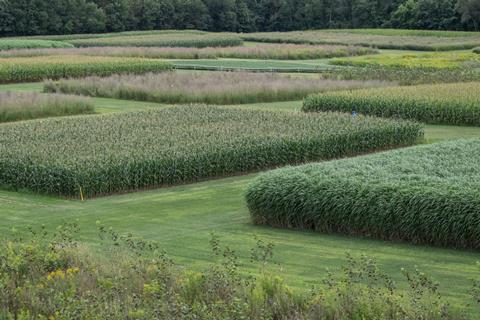A new study casts fresh light on how bioenergy crop microbiomes change in deeper soil, helping scientists to understand how plant microbiomes can be used to provide environmental services and support greener agricultural systems.

The results are published in a paper, ‘Stochastic and deterministic processes shape bioenergy crop microbiomes along a vertical soil niche’ that appears in Environmental Microbiology, an Applied Microbiology International publication.
Microbiome data analyst Gian Maria Niccolò Benucci, of Michigan State University, explained: “Human-induced climate change demands that societies address global energy systems, and sustainable biofuel cropping systems are an attractive option that leverages natural processes to sequester carbon into usable and valuable forms, including for energy needs and soil carbon storage.
“Plants form complex and interconnected networks with soil microbes, which are known to affect plant productivity and health. Our research aims to exploit these organisms to promote sustainable biofuel agriculture.
“Towards this aim, we characterized these plant-associated microbes in bioenergy cropping systems to understand how fungal and bacterial communities assemble in different bioenergy plant hosts along a soil depth profile.”
The methods
The team sampled soil and roots in poplar, switchgrass, and prairie research sites to a depth of 1 metre, then utilized high throughput DNA amplicon sequencing of specific ribosomal markers to characterize and classify fungal (ITS rDNA) and bacterial (16S rRNA) microbial communities associated with each of the paired (soil-root) samples.
“Our research showed that microbial communities in the deeper soil are less diverse, but more heterogeneous in the soils compared to root-associated microbial communities,” Dr Benucci said.
“Roots appear to generate niche-space for microbes, allowing for a more stable and less heterogeneous and diverse community of microbes with increasing depth compared to soils. Microbial communities not associated or dependent on roots for carbohydrates appear to become more heterogeneous in deeper soil layers.”
Yielding understanding
Dr Benucci said the study provides novel and foundational understanding of soil and root microbiomes and their interactions in connection to different bioenergy hosts and cropping systems.
“This knowledge is key to leverage plant microbiomes for the many functions they provide in the environment to support cleaner, and more sustainable agricultural and energy economies,” he said.
“Our work is foundational, but does make predictions that could be tested, including factors that drive microbial community composition with depth, and how between and within-Kingdom linkages impact community function at plot-level and landscape scales.
“In particular, our study addresses components of the deep soil that are critical to understand for ecosystem-level engineering and carbon accounting.”
‘Stochastic and deterministic processes shape bioenergy crop microbiomes along a vertical soil niche’ by Gian Maria Niccolò Benucci, Pedro Beschoren da Costa, Xinxin Wang and Gregory Bonito appears in Environmental Microbiology, published by Applied Microbiology International.
The study was supported by the Great Lakes Bioenergy Research Center, US Department of Energy, Office of Science, Office of Biological and Environmental Research under Award Number DE-SC0018409.
Gregory Bonito is one of the Co-PIs on this project that is focused on plant microbiomes, and in whose lab the research was conducted.
Phil Robertson, Carolina Cordova and Stacey Vanderwulp helped to coordinate sampling and processing of the samples. Gian Maria Niccolò Benucci prepared the Illumina sequencing libraries, with help from Pedro Beschoren da Costa and Xinxin Wang, and also ran the bioinformatic and statistical analyses, and also prepared the final manuscript with the assistance of co-authors.




No comments yet